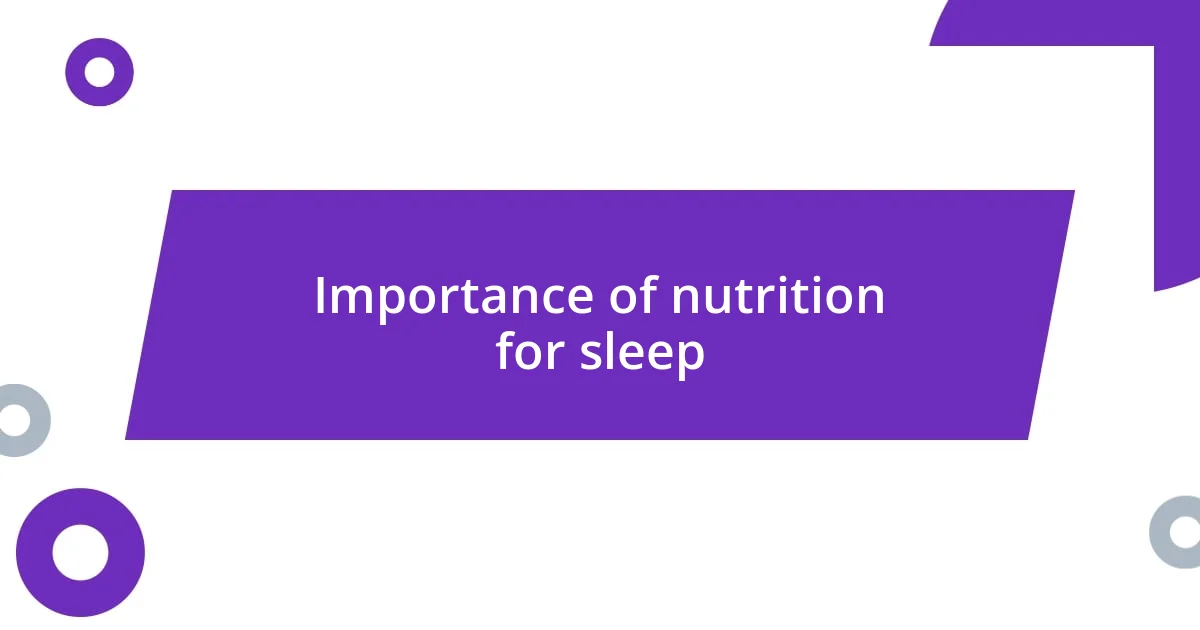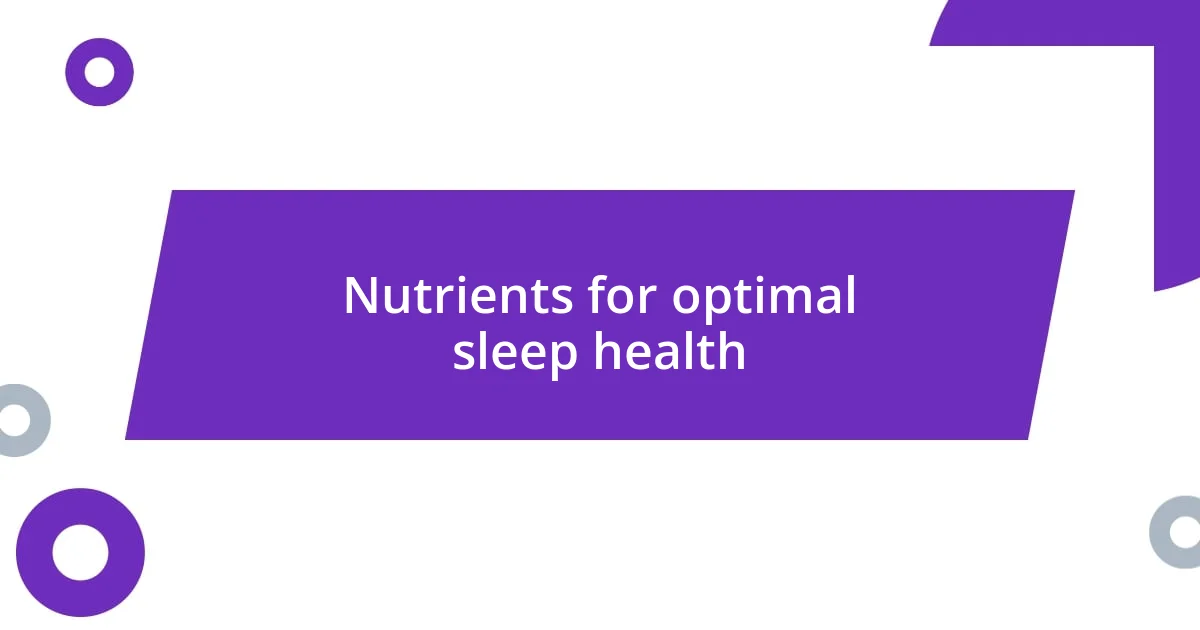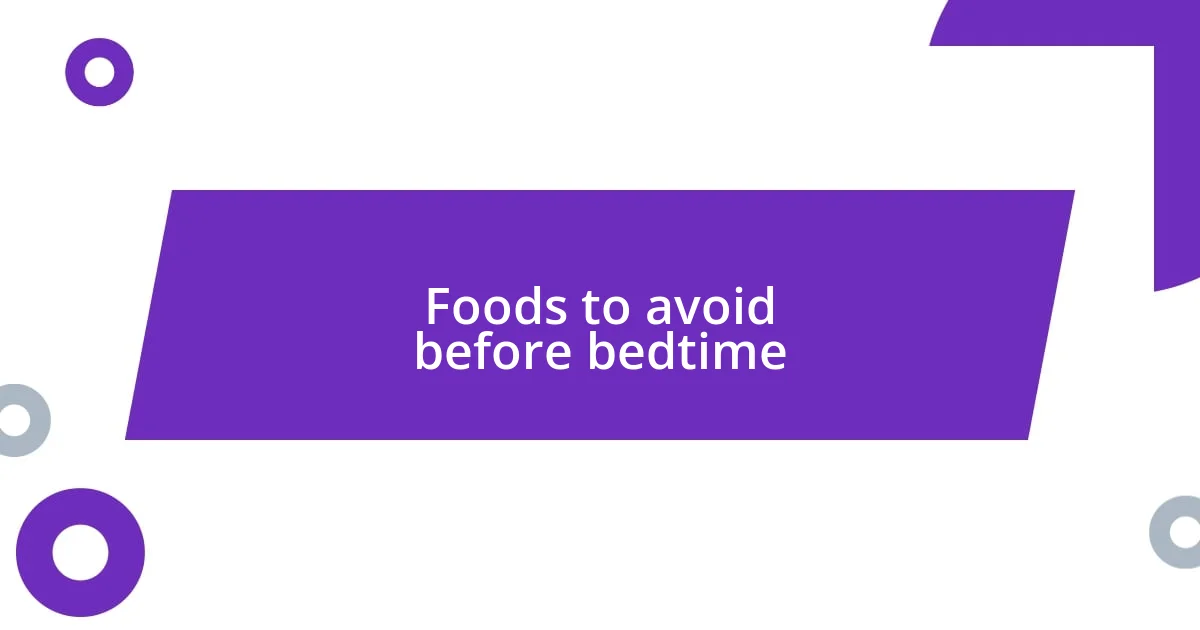Key takeaways:
- Sleep quality is influenced more by the depth of sleep and nutrition rather than just the number of hours slept.
- Key nutrients like magnesium, tryptophan, and omega-3 fatty acids found in specific foods can enhance sleep quality.
- Avoiding heavy meals, caffeine, and alcohol before bedtime is crucial for achieving restful sleep.

Understanding sleep quality
Sleep quality is not just about the number of hours we log. I’ve often found that a restless night can leave me feeling drained, regardless of how long I spent in bed. Have you ever tossed and turned, only to realize the next morning that you thought you slept but really didn’t?
From my experience, it’s the depth of sleep that truly counts. For instance, I once tracked my sleep with a smartwatch and discovered that while I was in bed for eight hours, my deep sleep was only a fraction of that time. It made me rethink not just my bedtime routine but also what I was consuming before bedtime.
I’ve learned that factors like stress, environment, and even our last meal can deeply impact how restorative our sleep really is. When I overindulged in caffeine too late in the day, I noticed that my nights were filled with constant wakefulness. It made me wonder, how much control do we actually have over the quality of our sleep?

Importance of nutrition for sleep
Nutrition plays a crucial role in our sleep patterns. I remember when I made simple changes to my evening meals, like swapping a heavy pasta dinner for a light salad with grilled chicken. The result? A remarkable improvement in my sleep. What I’ve discovered is that certain nutrients can really help us drift off more easily, while others might keep us tossing and turning.
Here are some key nutrients that contribute to better sleep quality:
- Magnesium: I often include almonds or spinach in my meals, as magnesium helps relax our muscles and calm the mind.
- Tryptophan: Found in foods like turkey or bananas, this amino acid has always made me feel a bit drowsy after dinner.
- Omega-3 Fatty Acids: I love adding salmon to my diet, knowing that it’s packed with omega-3s, which help regulate serotonin and melatonin levels.
- Complex Carbohydrates: I’ve found that whole grains keep me satiated without the crash that white carbs can cause, allowing for a smoother transition to sleep.
- Vitamin D: With my regular fish and fortified dairy intake, I’ve noticed better sleep patterns, possibly thanks to vitamin D’s role in regulating our sleep-wake cycle.
Making conscious dietary choices has certainly opened my eyes to the interplay of nutrition and sleep, leading to more restful nights.

Foods that promote better sleep
Eating certain foods can significantly improve sleep quality. I remember one particularly restless month where I felt like I was forever tossing and turning. That’s when I decided to pay closer attention to what I was eating, especially in the hours leading up to bedtime. I discovered that incorporating high-fiber foods like oatmeal and quinoa into my dinner helped. The gentle warmth of oatmeal, made just before bed, always seemed to wrap me in a cozy embrace, leading to a more sound night’s rest.
I also found that dairy products, particularly yogurt, could work wonders. There’s something soothing about a small bowl of yogurt mixed with honey that signals my body it’s time to wind down. I often add a sprinkle of walnuts for that extra crunch, along with some sips of herbal tea. These little rituals have transformed my evenings into a calming routine, making my body feel soothed and ready for sleep.
As I explored this further, I began experimenting with specific fruits, like kiwi and cherries. Eating kiwi, for instance, really surprised me. I noticed that after indulging in this vibrant green fruit, I could drift off more easily. Can you believe something so simple could have such a profound effect? It made me realize how some foods have the power to influence not only how we feel during the day but also how we rest at night.
| Food | Benefit for Sleep Quality |
|---|---|
| Oatmeal | High in fiber, promotes satiety and warmth, leading to restful sleep. |
| Yogurt | Contains calcium, promotes muscle relaxation and calming effects. |
| Kiwi | Rich in antioxidants and serotonin, linked to improved sleep onset. |
| Salmon | Provides omega-3 fatty acids, supports serotonin regulation. |
| Almonds | High magnesium content helps muscle relaxation. |

Nutrients for optimal sleep health
When I think about magnesium, I can’t help but reminisce about a night where I overindulged in a pizza loaded with cheese. I felt restless, and it occurred to me how much my body craved those greens instead. The difference was stark—on nights when I reached for spinach-stirred dishes, the soothing effect seemed to wrap around me like a warm blanket, leading me to deep sleep unlike any other. Isn’t it fascinating how something as simple as a leafy green can make such a profound impact on our rest?
Tryptophan’s role in sleep health deserves special mention. I’ve experimented with late-night snacks, and let me tell you, a few slices of turkey wrapped around a bit of avocado have worked wonders. They leave me feeling relaxed, almost as if they’re gently urging my body to slow down and prepare for sleep. Have you ever felt that gentle nudge towards sleep after a meal? It’s an incredible sensation when you realize that food can literally lead you to slumber.
Then there’s omega-3 fatty acids, which I always make a point to include in my meals. One evening, I decided to try a new recipe featuring salmon, and I marveled at how the flavors danced on my palate. Not only did it satisfy my taste buds, but I also noticed a smoother transition into sleep that night. I can’t help but wonder, how many of us overlook the incredible benefits of these nutrients in our everyday meals? They truly have the potential to transform our nighttime experience for the better.

Meal timing for sleep enhancement
It’s interesting to consider how meal timing can significantly impact our sleep quality. I often find myself trying to finish dinner at least two to three hours before I hit the sack. When I ignore this rule and eat too close to bedtime, the discomfort often lingers, making it challenging to unwind. Have you ever noticed how a late meal can feel like a weight on your stomach, dragging you down instead of lulling you to dreamland?
One night, I decided to test an earlier dinner time, opting for a light salad with grilled chicken. The difference was remarkable; I felt lighter and more at ease, allowing my mind to relax for sleep. I genuinely believe that pairing the right meal with the right timing can create a peaceful transition into rest. It’s almost like setting the tone for the night, don’t you agree?
Additionally, I’ve come to appreciate the role of bedtime snacks. I quietly savor a small portion of almonds or a slice of whole-grain toast with almond butter, and it feels comforting, almost like an invitation to my body to engage in a nightly reset. These little rituals have become a cherished part of my evening routine, nurturing a sense of gratitude and contentment as I prepare for sleep. It’s amazing how thoughtful meal timing can create a serene atmosphere for rest.

Dinner ideas for better sleep
When I ponder dinner ideas for better sleep, I often find myself gravitating towards creamy risottos loaded with mushrooms. One evening, after preparing a spoonful of this dish, I noticed how the warmth and the earthy flavors completely enveloped me. It felt like a cozy hug, luring me into a gentle state of relaxation. Have you ever experienced that feeling where a meal just feels right and sets the stage for a peaceful night’s sleep?
I also love the combination of brown rice and roasted vegetables. There was a time when I experimented with this meal, tossing in some broccoli and sweet potatoes seasoned with a hint of olive oil. As I savored each bite, I realized how satisfying and grounding it felt, almost like my body was thanking me for treating it kindly. The calming effects of whole grains are so underrated; they can really make a difference in how we unwind in the evening. Isn’t it intriguing how the right mix of flavors can serve not just to fill our bellies, but to prepare our minds for rest?
On nights when I’ve craved something lighter, a simple bowl of miso soup has become my go-to. One specific night stands out to me—after a busy day, that warm, savory broth felt like a soothing remedy. I still recall the way the seaweed and tofu seamlessly blended, instilling a sense of calm with each sip. It’s remarkable how something so simple can evoke tranquility and help signal to my body that it’s time to wind down. What comfort foods do you turn to for that sense of peace at dinner?

Foods to avoid before bedtime
Some foods truly can sabotage our efforts for a good night’s sleep. For instance, I’ve learned the hard way that heavy, rich meals before bedtime tend to keep me tossing and turning. I still remember a night when I indulged in a creamy pasta dish just before bed; it felt delightful at the moment, but my body had a different plan. The discomfort lingered long into the night, and I couldn’t help but wonder, why do I keep doing this to myself?
Then, there’s caffeine, a known sleep disruptor. I’ve often made the mistake of enjoying a late afternoon coffee, thinking it wouldn’t affect me. To my surprise, lying awake at 2 AM became a familiar routine. Have you ever sipped on something that felt cozy while unknowingly setting yourself up for a restless night? I eventually realized that even chocolate contains caffeine and can send my sleep plans spiraling, so now I keep my evening snacks chocolate-free.
Lastly, I’ve come to recognize the impact of alcohol on my sleep quality. While I used to believe a glass of wine was a good way to unwind, it often led to fragmented sleep and vivid dreams. That realization struck me while lying awake one night, thinking about how the initial drowsiness gave way to a sleepless battle. Does this sound familiar? I now opt for soothing herbal teas, and those evenings have been far more restorative. It’s incredible how what we choose to consume can tell our body when it’s truly time to rest.














